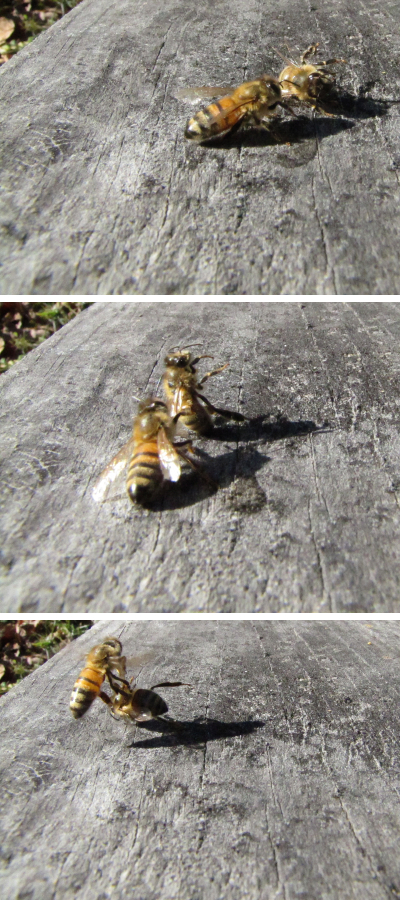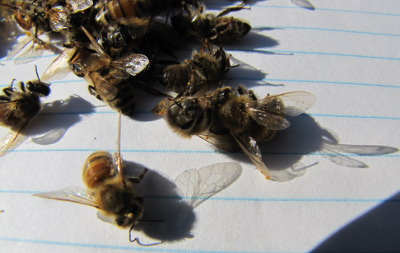
Another weak hive
 When I last checked our two
remaining honeybee hives, one
seemed to be doing fine, but the other had a cluster
as small as the cluster of our now-dead hive when I checked them before
their demise. Every morning thereafter, I put an ear up to the
small hive, and couldn't hear a sound, but warm days this past weekend
did tempt a few bees out to fly around. I have a hard time
imagining that such a tiny hive could bulk back up and survive, but the
frigid temperatures of December and January seem to have broken, so
maybe the cluster will be large enough to make it.
When I last checked our two
remaining honeybee hives, one
seemed to be doing fine, but the other had a cluster
as small as the cluster of our now-dead hive when I checked them before
their demise. Every morning thereafter, I put an ear up to the
small hive, and couldn't hear a sound, but warm days this past weekend
did tempt a few bees out to fly around. I have a hard time
imagining that such a tiny hive could bulk back up and survive, but the
frigid temperatures of December and January seem to have broken, so
maybe the cluster will be large enough to make it.
Why this hive has such
low numbers is a mystery to me. They didn't seem to have gone
through a starvation cycle like our dead hive --- there was honey
within easy reach of the cluster each time I checked. They show
none of the classic signs of varroa mite overinfestation either ---
after watching one valiant worker struggle to haul out dead bee after
dead bee, I swept out about twenty carcasses and saw no mites or
deformed wings. But the colony's population is so low that
something is clearly wrong.
Reading
Ross Conrad's Natural
Beekeeping has
helped me realize that your second winter with a hive is when trouble
is likely to begin. When you receive a package of bees, they
generally arrive relatively disease-free, and it takes a while for
pests and diseases to make their way to the hive. If I'd known
 better, I would have been sure to split my hives last year, which would
have helped break the cycle of problems and set each hive back closer
to their package, disease-free state. The good news is that any
hive or hives that survive this second winter are keepers, and I should
be able to split it or them and go into later years with a better
adapted apiary. Still, it's painful to watch and wait and hope
that this tiny colony won't bite the dust.
better, I would have been sure to split my hives last year, which would
have helped break the cycle of problems and set each hive back closer
to their package, disease-free state. The good news is that any
hive or hives that survive this second winter are keepers, and I should
be able to split it or them and go into later years with a better
adapted apiary. Still, it's painful to watch and wait and hope
that this tiny colony won't bite the dust.
Want more in-depth information? Browse through our books.
Or explore more posts by date or by subject.
About us: Anna Hess and Mark Hamilton spent over a decade living self-sufficiently in the mountains of Virginia before moving north to start over from scratch in the foothills of Ohio. They've experimented with permaculture, no-till gardening, trailersteading, home-based microbusinesses and much more, writing about their adventures in both blogs and books.
Want to be notified when new comments are posted on this page? Click on the RSS button after you add a comment to subscribe to the comment feed, or simply check the box beside "email replies to me" while writing your comment.

I've lost a hive already this year and have another I'm worried about. My mentor in nearby Ft. Valley, VA has lost nearly half of his hives and are usually pretty secure in winter. I'm transitioning away from the Langstroth hives completely this spring. Last winter I built a few Kenyan long hives, but the more I read about naural beekeeping the more I think that futzing with the frames is behind my (our) misfortune. This year I'm building some Warre hives.
The reduced area and the lack of side and bottom bars inside the Kenyan and Warre brood box decrease the dead space that the cluster has to expend energy to keep warm in the cold season. This, and the addition of the quilt on the Warre, basically an upper-most super with some coarse cloth stapled around the base so it can hold a few inches of saw dust, helps absorb moisture from fanning nectar and stale respiration from the cluster. This wicks condensate out of the hive and keeps the cluster warm and dry and affords less purchase for fungi and bacteria that promote foul brood and nosema, and it's the sort of quick-fix you might try on your current hives. Mark could probably whip together a couple of Warre's together in a weekend with stuff you have laying around. There are free plans availble here:
http://thebeespace.net/2008/07/30/introduction-warre-beehive-construction-guide/
I hope they pull through. Skill and persistence, Anna!
~Dean
I'll look forward to hearing how your Warre hives work out! I've been refraining from using any of the alternative hive methods because we got the free Langstroth hives. But it would be worth putting money into a better hive if it's going to keep the bees healthier!
Ross Conrad used something like you're talking about in the top of his Langstroth hives. We'll definitely have to do that, if nothing else, before next winter!
this story made me saddddddddddd. those poor little bees struggling to get the sick & dead out.
i am so sorry that you are having problems, however education cost, even if it is the loss of a hive. i think you are an awesome beekeeper.
it will get better, we are covered in 1 " of solid ice. limbs everywhere. temps low. staying in.
I know --- me too! I felt like begging that little bee to conserve her strength!
I'm glad you can stay inside. It looks like we missed that storm --- just lots of rain last night.